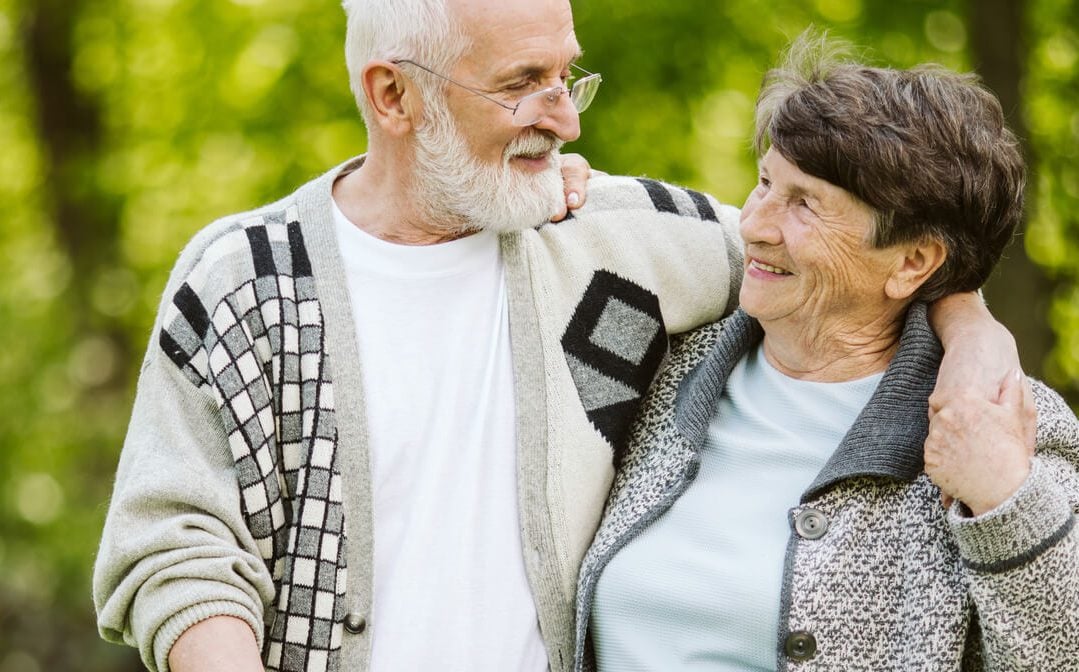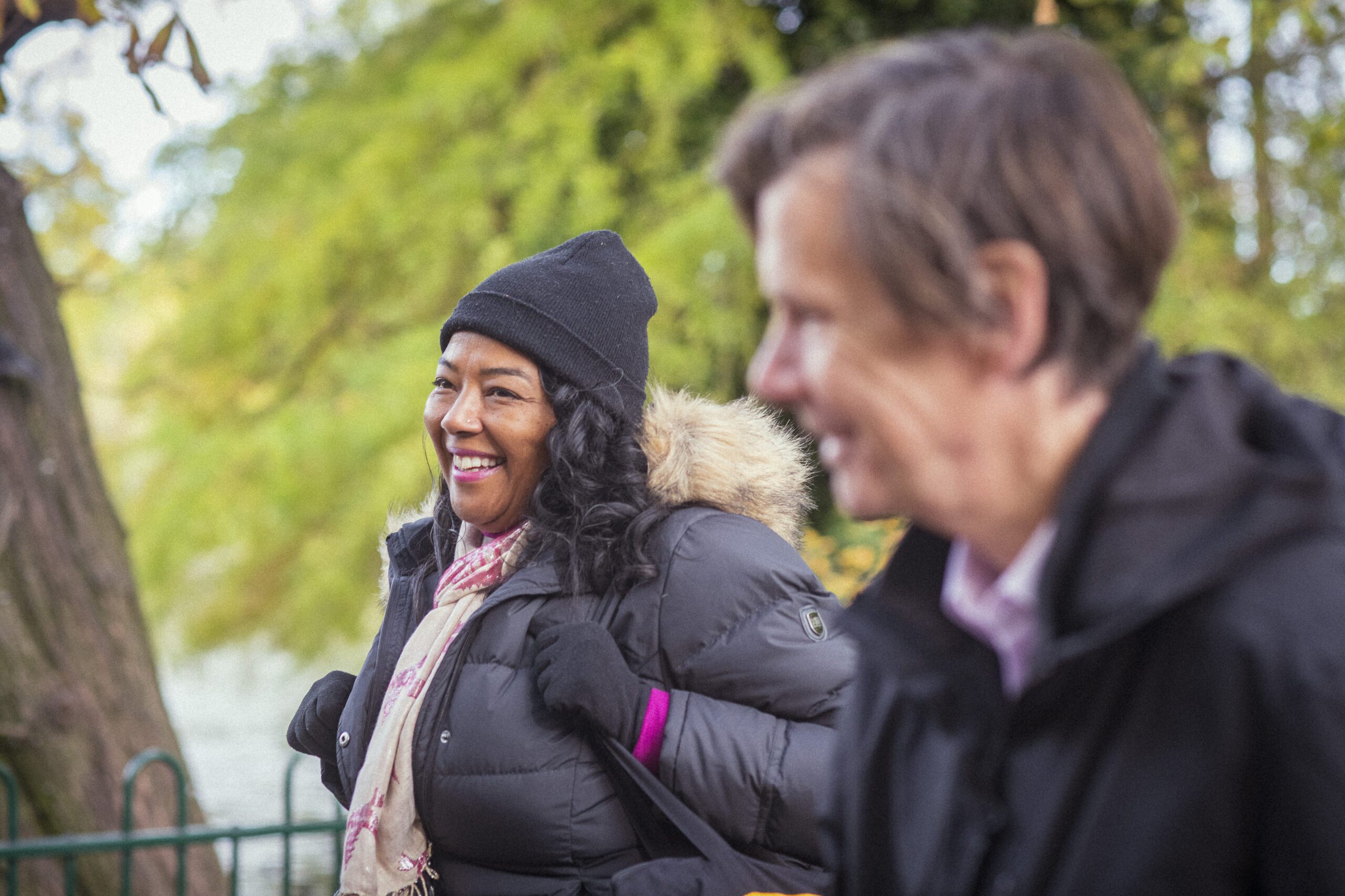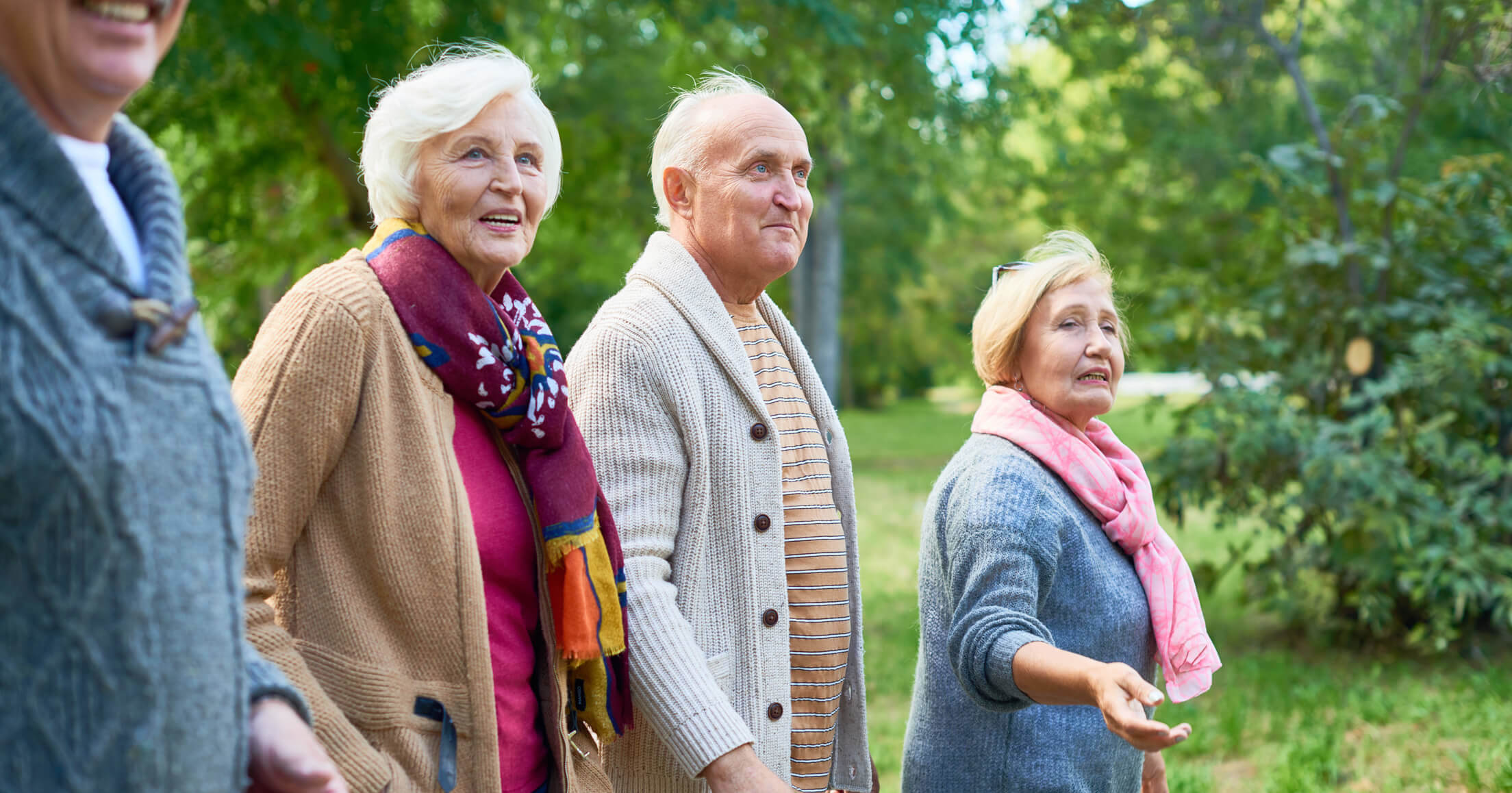The benefits of walking for older adults
Tags
Articles
As a low impact exercise, even a short walk at a gentle pace can give the body a full work out, with very little risk of injury, making it a great form of exercise for the elderly. In this article we look at how to get the most from walking, whether you’re heading out yourself or arranging support for a loved one.
Walking is widely considered to be one of the best, yet underrated forms of exercise – especially for the elderly. As we grow older, we may become less mobile, our balance may start to decline, and painful conditions like arthritis can make it harder to stay active.
What is walking good for?
There are many health benefits of walking for the elderly. As well as keeping the heart healthy, it supports digestion and boosts the immune system.
Walking can encourage better mental health too. Getting out into nature, exploring new places, and spending time with others can all help reduce feelings of worry, and keep our minds active and engaged.
Walking is good for sciatica
People over the age of 60 often experience back pain due to the joints in the spine wearing down. Conditions that affect the nerves in the spine, such as sciatica, can also cause back pain, as well as weakness in the legs.
Just a few minutes of walking every day releases pain-fighting endorphins, and can reduce inflammation, which can ease pain and help fight future flare ups.
Walking after a meal can help digestion
We become more susceptible to digestive problems and constipation as we age. A gentle walk, especially after a meal can help the muscles in the bowel to contract, and reduce the risk of constipation.

Walking can be a good exercise for neuropathy
Neuropathy is a term used to describe a range of health problems involving damage to nerves.
Nerves control a number of functions in the body. They allow us to feel sensations like touch and pain, control our reflexes, and regulate automatic functions such as bladder control.
The most common symptoms of neuropathy is numbness or pain in the hands and feet. However it can also cause muscle weakness, and stop some of the organs in the body from functioning as normal.
People with diabetes often experience neuropathy because excess blood sugar can harm nerves.
It was once believed that those living with neuropathy should avoid exercise, but not anymore. Taking short walks three times a week can help improve muscle strength, lower blood sugar, and ease pain.
Walking benefits for mental health
Walking for Health, England’s largest network of free walking schemes, believes walking can improve self-esteem, reduce anxiety, and provide an all-round mood boost.
Mental health charity Mind also says that simply being outside can do wonders for mental health. The greenery of parks and woodland can have a calming effect, while natural light has been proven to increase the amount of mood-enhancing chemicals in the brain.
Walk and talk therapy
Older people may feel unable to seek professional support when they’re feeling anxious or depressed. Some may think sitting in a room and talking about their feelings is not the ‘done thing’ because of outdated stigmas surrounding mental health issues.
Walk and talk therapy can help break down these barriers. It gives people the opportunity to meet with a counsellor in a neutral, outside space, and walk and talk at a pace they choose.
Some people find being in nature reassuring, making it easier to speak openly.

How to help the elderly enjoy walking
Do a little everyday
Walking can easily become part of your daily routine, and doesn’t mean heading out for an hour long ramble.
It’s often said that the best pace to keep is one where you’re still able to hold a conversation, however any movement is better than no movement, so don’t feel pressured to walk at a pace that’s uncomfortable.
Some ways you can add walking into your regular routine include –
- walking to the shops instead of driving or getting the bus
- using the stairs instead of the lift or escalator
- parking further away from your destination
- if you’re an animal lover, using a pet sitting site like Borrow My Doggy can give you a great reason to walk around your local park each week
Comfortable walking shoes for the elderly
Ensuring your feet are properly supported is essential, especially for anyone living with foot problems, such as plantar fasciitis, bunions, or arthritis.
Walking shoes should have a sturdy sole, be well padded around the ankle and toes, and have enough room for potential swelling. Often a good pair of trainers will do the job.
Walking Aids
Walking aids for the elderly come in all shapes and sizes, and finding the right aid depends on your loved one’s level of mobility and overall health.
If someone needs a little extra help with their balance, or experiences pain or stiffness in one leg, they may find a walking stick helpful.
Walking frames and rollators provide greater balance support. They’re fully adjustable, and often have compartments for storing a water bottle, medication, or other personal items.
Walking aids can be expensive, and it can take time to find the right one for your loved one. Walking aid rentals can be a good option if they’d like to try out a few different types, or if they only require support for a short time, such as after a minor injury.
How to measure for a walking stick
A walking stick that’s the wrong height can cause more harm than good. These steps can help ensure a stick is the correct height for your loved one.
- Ensure they’re wearing the shoes they walk in most often
- Check that they’re standing in a natural position
- Set the stick flat on the floor, ensuring it’s around 15cm from the side of their foot
- Their arms should be relaxed by their side, with a very slight bend at the elbow
- If the top of the walking stick is level with their wrist, it’s the right height
Download the NHS app for walking
The NHS has some helpful resources to ensure older people can be more active, safely.
The Active 10 app can be downloaded onto most smartphones, and can help track steps, set realistic and safe goals, and provide tips to make an active lifestyle more enjoyable.
Take an early morning walk
Rheumatoid arthritis, which is caused by inflammation in the joints, and osteoarthritis – the type caused by wear and tear, can both leave older adults feeling stiff when they wake up. Taking a stroll in the morning can help ease this stiffness in the muscles and joints.
For those living with dementia, research suggests heading out for a short walk in the morning could also help manage sundowning behaviour.
People with dementia often feel brighter and more alert in the morning. An early burst of activity, combined with natural sunlight, can reduce restlessness at the end of the day.
Join a walking club
Walking groups cater for all ages and abilities, and there are many walking clubs for over 60s across the UK.
Walking groups London
South East and Surrey walking clubs
Walking groups Scotland
South West walking groups
Walking groups North East
Walking groups North West
Walking groups Wales
To find groups in your local area, try the Walking for Health group walks finder.
If you’re worried about how much exercise you should be doing, or that your health may impact your ability to stay active talk to your doctor to find out if it’s safe. They may need to give you some exercises or pointers to help you build up your strength gradually.
Read our latest blogs
Browse the latest blogs and tips on living well in later life.